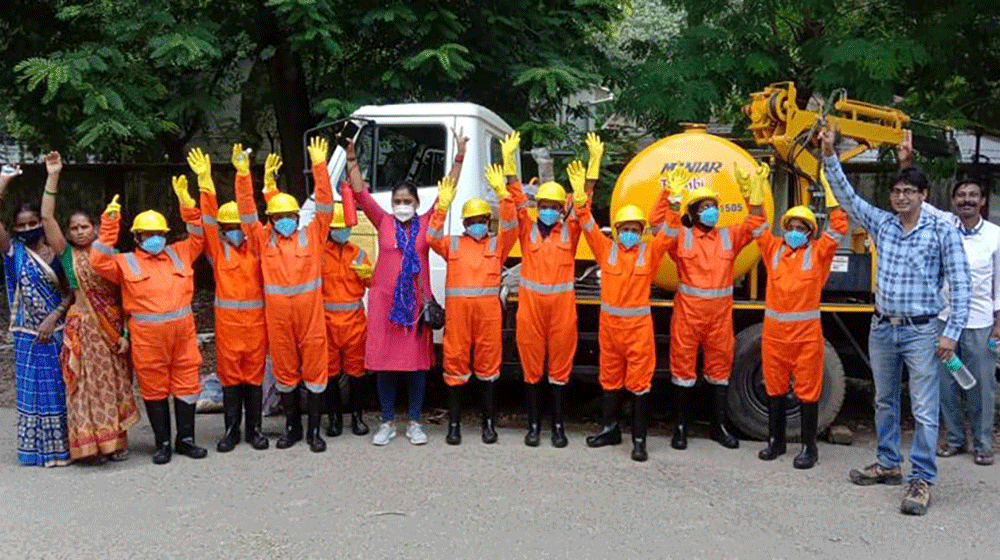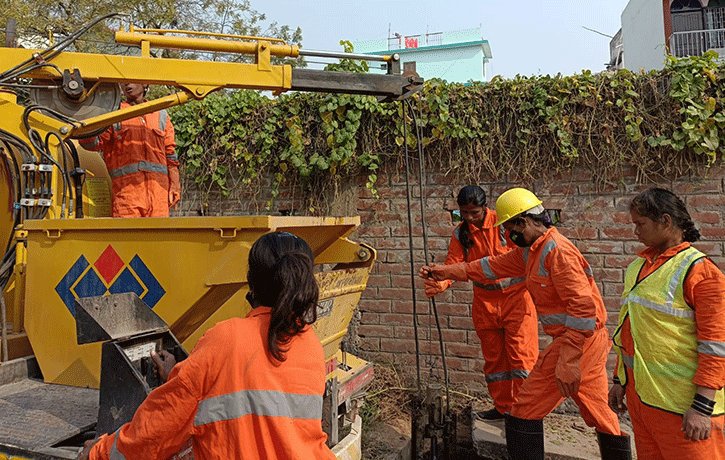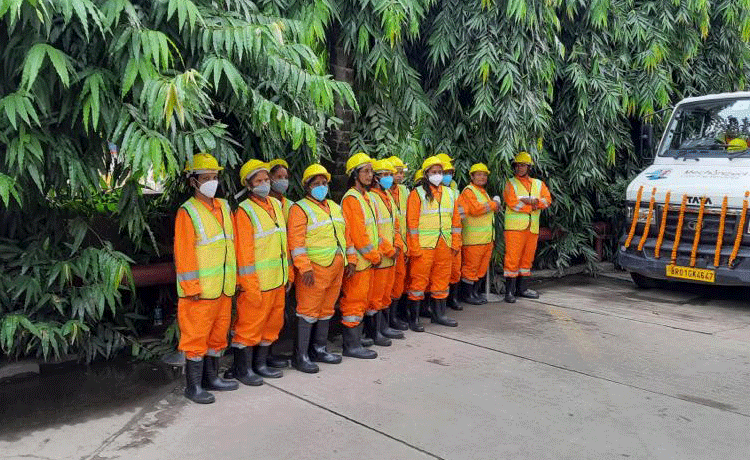A fresh start for women sanitation workers in India

PATNA, India – “When we wear our uniforms, people recognize us and we feel a sense of pride. They say – just look at what these women have achieved and the work they are doing… They have left the men behind.”
Rani, 28, lives with her husband, two children, and in-laws in a slum settlement in Patna city, in the state of Bihar. Already a sanitation worker by profession, she also worked as a domestic helper. But even with two jobs, her daily wages were barely enough to scrape by. When she learned that the Women’s Mechanized Cleaning Cooperative used machines and safety equipment instead of manual labour and was led by and for women, she was eager to join.
Empowering Women with Opportunity
UNFPA launched the initiative was launched in October 2021 with the support of the governing body of Patna city. The programs aims to eliminate the degrading and hazardous practice of manual cleaning of public sewer systems and help women gain financial independence.
Rani’s colleague Indu lives with her in-laws and her three children in the same slum. After her husband left her, she provided for her family by working as a domestic helper. Then she learned about the chance to retrain with the Cooperative.
“My biggest concern was losing my life, especially when I saw the men going underground to scavenge and clean manually. But now with the mechanized program, women can also do this job. We can do it well and we can earn our own income.”
Women employed with the program are trained to operate specialized machines to clean the city’s sewers and septic tanks. The program offers a way to make a living without endangering their lives. UNFPA India’s Cooperative aims to lift sanitation workers and their families out of dire circumstances through dignified, safer working conditions.

The stigma of scavenging
Although banned in India under the Manual Scavengers and their Rehabilitation Act, the practice persists. Manual scavengers are among the poorest and most disadvantaged communities in the country.
The work is demanding and discriminatory, not only to the men and women directly engaging in it but also to their families, who suffer immense social stigma. The Dalit community almost exclusively performs manual scavenging. They are among the poorest and most disenfranchised of India’s traditional caste system.
The repercussions of being a member of the sanitation worker community fall hardest on women. In addition to being socially marginalization, they are at risk of gender-based violence, both inside and outside of their home. Conditions in the slums are often unsafe, with frequent substance abuse, a lack of clean water or sanitation, and scarce access to sexual and reproductive health services. Without these resouces, women and girls vulnerable to attacks, illness, and unintended pregnancies.
The wages earned from manual scavenging barely cover two meals a day, leaving families at higher risk of going hungry. The children of sanitation workers are also often excluded from school, exposing girls to child marriage and limited employment prospects. In Bihar, 40 percent of girls marry under the legal age of 18. Dalits have a fertility rate higher than the state’s rate of 3 children per household.
The Care You Make Possible

To mitigate these vulnerabilities, UNFPA supports builds capacity and awareness around violence against women, child marriage, and sexual and reproductive health services. Stark gender inequalities, particularly in underserved settlements and communities, mean women and girls’ health is often neglected. Child marriage and pregnancy contribute to high levels of maternal death, particularly among women under the age of 24.
Now a middle-income country, India has seen significant improvements in health and education over the past few decades. However, vast inequalities still exist, endangering lives and preventing women and girls’ from fulfiling their personal, social, and economic potential.
Almost a quarter of girls in the country are child brides, which although staggering is an improvement on nearly 50% a decade ago. On average, 30 percent women in India aged 15-49 have experienced physical or sexual violence. One-third of married women in the same age bracket have experienced intimate partner violence. In Bihar, the figure is as high as 40 per cent.
In 2020, UNFPA India reached over 31 million people with sexual and reproductive health and gender-based violence services and COVID-19 awareness-raising activities. More than 1 million people from vulnerable groups, including pregnant women, the elderly, and sanitation workers, received these UNFPA services. They were also connected with health and social protection systems. These resources help them claim their right to protect their freedoms, families, and futures. 5 million girls received UNFPA support on prevention and protection from early, forced, and child marriage.
Thank you for making a difference in the lives of women like Rani and Indu.
Rani said that at the start, people were not supportive and taunted her for cleaning street sewers. But she never lost hope. Her hard work has earned her economic and social capital and will help her to send her children to school. The same people who used to discourage her have now started to respect her determination. Today, some even ask how they too can work under this project.
As one sanitation worker in India told UNFPA, “By being able to do this job with machines, I can now earn a living and my children will be able to study further and have brighter futures.”